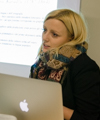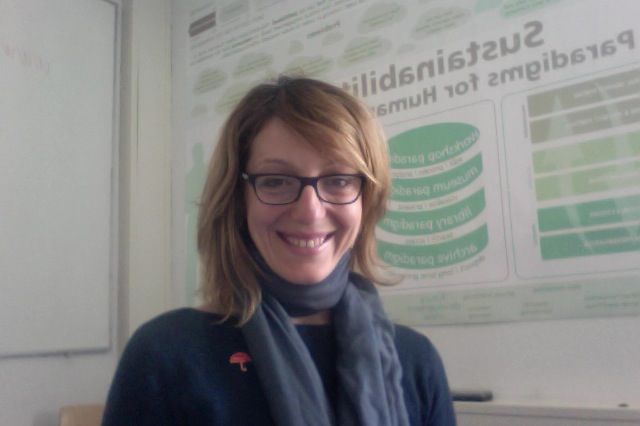Studiare
In questa sezione è possibile reperire le informazioni riguardanti l'organizzazione pratica del corso, lo svolgimento delle attività didattiche, le opportunità formative e i contatti utili durante tutto il percorso di studi, fino al conseguimento del titolo finale.
Calendario accademico
Il calendario accademico riporta le scadenze, gli adempimenti e i periodi rilevanti per la componente studentesca, personale docente e personale dell'Università. Sono inoltre indicate le festività e le chiusure ufficiali dell'Ateneo.
L’anno accademico inizia il 1° ottobre e termina il 30 settembre dell'anno successivo.
Calendario didattico
Il calendario didattico indica i periodi di svolgimento delle attività formative, di sessioni d'esami, di laurea e di chiusura per le festività.
| Periodo | Dal | Al |
|---|---|---|
| I SEMESTRE | 3-ott-2016 | 21-gen-2017 |
| II SEMESTRE | 27-feb-2017 | 10-giu-2017 |
| Sessione | Dal | Al |
|---|---|---|
| Lingue - SESSIONE INVERNALE | 23-gen-2017 | 25-feb-2017 |
| Lingue - SESSIONE ESTIVA | 12-giu-2017 | 29-lug-2017 |
| Lingue - SESSIONE AUTUNNALE | 21-ago-2017 | 23-set-2017 |
| Sessione | Dal | Al |
|---|---|---|
| Lingue - Sessione di laurea invernale | 3-apr-2017 | 8-apr-2017 |
| Lingue - Sessione di laurea estiva | 10-lug-2017 | 15-lug-2017 |
| Lingue - Sessione di laurea autunnale | 18-dic-2017 | 21-dic-2017 |
| Lingue - sessione di laurea invernale | 23-mar-2018 | 29-mar-2018 |
| Periodo | Dal | Al |
|---|---|---|
| Festa di Ognissanti | 1-nov-2016 | 1-nov-2016 |
| Festa dell'Immacolata | 8-dic-2016 | 8-dic-2016 |
| Vacanze Natalizie | 23-dic-2016 | 7-gen-2017 |
| Vacanze Pasquali | 14-apr-2017 | 18-apr-2017 |
| Festa della Liberazione | 25-apr-2017 | 25-apr-2017 |
| Festa del Lavoro | 1-mag-2017 | 1-mag-2017 |
| FESTA DEL SANTO PATRONO SAN ZENO | 21-mag-2017 | 21-mag-2017 |
| Festa della Repubblica | 2-giu-2017 | 2-giu-2017 |
| Vacanze Estive | 14-ago-2017 | 19-ago-2017 |
Calendario esami
Gli appelli d'esame sono gestiti dalla Unità Operativa Segreteria Corsi di Studio Lingue e letterature straniere.
Per consultazione e iscrizione agli appelli d'esame visita il sistema ESSE3.
Per problemi inerenti allo smarrimento della password di accesso ai servizi on-line si prega di rivolgersi al supporto informatico della Scuola o al servizio recupero credenziali
Docenti
 alessandro.bigardi@univr.it
alessandro.bigardi@univr.it

Bradas Marija
 marija.bradas@univr.it
marija.bradas@univr.it
 paolamaria.caleffi@univr.it
paolamaria.caleffi@univr.it
 veronica.gobbato@univr.it
veronica.gobbato@univr.it
 tiziana.mancinelli@univr.it
tiziana.mancinelli@univr.it
 silvia.zollo@univr.it
silvia.zollo@univr.it
Piano Didattico
Il piano didattico è l'elenco degli insegnamenti e delle altre attività formative che devono essere sostenute nel corso della propria carriera universitaria.
Selezionare il piano didattico in base all'anno accademico di iscrizione.
1° Anno
| Insegnamenti | Crediti | TAF | SSD |
|---|
Prima lingua straniera anno 1Seconda lingua straniera anno 1Prima letteratura straniera anno 1Seconda letteratura straniera anno 12° Anno Attivato nell'A.A. 2017/2018
| Insegnamenti | Crediti | TAF | SSD |
|---|
Prima lingua straniera anno 2Seconda lingua straniera anno 2Prima letteratura straniera anno 2Seconda letteratura straniera anno 2Un insegnamento a scelta tra i seguenti3° Anno Attivato nell'A.A. 2018/2019
| Insegnamenti | Crediti | TAF | SSD |
|---|
Prima lingua straniera anno 3Seconda lingua straniera anno 3Una filologia inerente alla prima o seconda lingua| Insegnamenti | Crediti | TAF | SSD |
|---|
Prima lingua straniera anno 1Seconda lingua straniera anno 1Prima letteratura straniera anno 1Seconda letteratura straniera anno 1| Insegnamenti | Crediti | TAF | SSD |
|---|
Prima lingua straniera anno 2Seconda lingua straniera anno 2Prima letteratura straniera anno 2Seconda letteratura straniera anno 2Un insegnamento a scelta tra i seguenti| Insegnamenti | Crediti | TAF | SSD |
|---|
Prima lingua straniera anno 3Seconda lingua straniera anno 3Una filologia inerente alla prima o seconda lingua| Insegnamenti | Crediti | TAF | SSD |
|---|
Legenda | Tipo Attività Formativa (TAF)
TAF (Tipologia Attività Formativa) Tutti gli insegnamenti e le attività sono classificate in diversi tipi di attività formativa, indicati da una lettera.
Informatica per gli studi umanistici (2018/2019)
Codice insegnamento
4S02248
Docente
Coordinatore
Crediti
6
Lingua di erogazione
Italiano
Settore Scientifico Disciplinare (SSD)
INF/01 - INFORMATICA
Periodo
I semestre dal 1-ott-2018 al 12-gen-2019.
Obiettivi formativi
Questo corso ha l’obiettivo di fornire i fondamenti essenziali e le abilità pratiche in diversi campi della testualità digitale, presentando le teorie e i metodi dell'informatica umanistica anche in campo internazionale. Il corso si divide in due parti: la prima parte verrà dedicata alle diverse fasi di realizzazione di una edizione scientifica digitale. La seconda si concentrerà su principali metodologie e strumenti per l’analisi computazionale del testo letterario.
Programma
Il corso prevede la trattazione dei seguenti argomenti:
- Fondamenti di Informatica umanistica e della testualità digitale. Introduzione alla storia dell’evoluzione del Web. Edizioni scientifiche digitali.
- Standard e codifica dei caratteri, multimedialità, l'architettura dell'informazione;
- I linguaggi di marcatura: XML, HTML5, CSS. Verrà dedicato particolare spazio all'uso del linguaggio di marcatura TEI (Text Encoding Initiative) e agli strumenti e alle risorse per il suo utilizzo, assieme agli editor di supporto;
- L’edizione scientifica digitale: verranno individuate i diversi metodi che intervengono nella realizzazione di una risorsa digitale; verrà data particolare attenzione alla modellizzazione delle strutture testuali, alla trascrizione e all’apparato critico.
- Analisi del testo: metodologie e applicazioni. Principali tecniche di analisi computazionale: Stilometria, Topic Modeling, Sentiment Analysis
La seconda parte del corso verrà eseguita in compresenza con il Dott. Simone Rebora.
BIBLIOGRAFIA
Introduzione:
Susan Hockey, 2004, "The History of Humanities Computing", in A Companion to Digital Humanities, ed. Susan Schreibman, Ray Siemens, John Unsworth. Oxford: Blackwell. Online: http://www.digitalhumanities.org/companion/view?docId=blackwell/9781405103213/9781405103213.xml&chunk.id=ss1-2-1&toc.depth=1&toc.id=ss1-2-1&brand=defaultx
Prima parte - Edizione scientifica digitale:
Elena Pierazzo, Tiziana Mancinelli, 2018, Che cos'è un'edizione scientifica digitale? Roma: Carocci.
DariahTeach - https://teach.dariah.eu/ in particolare "Digital Scholarly Editions: Manuscripts, Texts and TEI Encoding" -
Elena Pierazzo, 2005, La codifica di testi. Una introduzione. Roma: Carocci (Capitolo 1)
Seconda parte - Metodi computazionali:
Ted Underwood, 2017, "A Genealogy of Distant Reading." Digital Humanities Quarterly 11(2). Online: http://www.digitalhumanities.org/dhq/vol/11/2/000317/000317.html
J. Berenike Herrmann, Karina van Dalen-Oskam, and Christof Schöch, 2015, "Revisiting Style, a Key Concept in Literary Studies." Journal of Literary Theory 9(1): 25-52. Online: https://zenodo.org/record/50893
Fabio Ciotti, 2017, "What's in a Topic Model? Critica teorica di un metodo computazionale per l’analisi del testo." Testo e Senso 18. Online: http://testoesenso.it/article/viewFile/462/pdf_227
Simone Rebora and Federico Pianzola, 2018, "A New Research Programme for Reading Research: Analysing Comments in the Margins on Wattpad." DigitCult 3(2): 19–36. Online: http://www.digitcult.it/index.php/dc/article/view/67/62
Modalità d'esame
La frequenza al corso è vivamente consigliata. Materiali e risorse saranno forniti durante il corso come supporto alle lezioni.
Chi non è in grado di frequentare le lezioni deve concordare il programma con l'insegnante.
La prova d'esame è scritta.
Tipologia di Attività formativa D e F
Per scoprire tutte le attività didattiche accreditate dal Collegio didattico clicca qui
Prospettive
Avvisi degli insegnamenti e del corso di studio
Per la comunità studentesca
Se sei già iscritta/o a un corso di studio, puoi consultare tutti gli avvisi relativi al tuo corso di studi nella tua area riservata MyUnivr.
In questo portale potrai visualizzare informazioni, risorse e servizi utili che riguardano la tua carriera universitaria (libretto online, gestione della carriera Esse3, corsi e-learning, email istituzionale, modulistica di segreteria, procedure amministrative, ecc.).
Entra in MyUnivr con le tue credenziali GIA: solo così potrai ricevere notifica di tutti gli avvisi dei tuoi docenti e della tua segreteria via mail e a breve anche tramite l'app Univr.
Area riservata studenti
Assegnazione tutore
Attività accreditate D/F
Calendario didattico dettagliato
Cambio lingua curriculare
Competenze informatiche
Competenze linguistiche (prima e seconda lingua)
Competenze linguistiche in triennale (terza lingua CFU F)
Compilazione del piano didattico
Corso di Lingua portoghese
Erasmus+ e altre esperienze all'estero
Esercitazioni Linguistiche CLA
Prova finale
La discussione dell'elaborato scritto avviene in presenza di una Commissione Istruttoria composta da due docenti dell'Ateneo che si riunisce nei giorni precedenti la proclamazione e che propone alla Commissione di Laurea (composta da almeno tre docenti) una valutazione. Alla prova finale potranno essere attribuiti non più di 5 punti su 110. L'attribuzione della lode avviene o su proposta del relatore, se l'elaborato è ottimo e la media dei voti conseguiti negli esami dallo Studente raggiunge almeno 110 punti, o in maniera automatica se la media raggiunge almeno 113 punti.
Il voto di laurea è formato da:
a) la media aritmetica dei voti conseguiti negli esami, rapportata a 110,
b) la valutazione dell'elaborato finale,
c) punti supplementari di incentivazione:
- un massimo di 2 punti per le lodi (1 punto per due lodi, 2 punti per più lodi).
- 2 punti per la partecipazione al Programma Erasmus o assimilato, a condizione che lo studente: abbia acquisito almeno 12 CFU per un semestre di mobilità nel corso del ciclo di studi (24 CFU per due semestri di mobilità) e consegua il titolo finale entro la durata normale del corso di studi.
- 1 punto per la partecipazione al Programma Erasmus o assimilato, a condizione che lo studente: abbia acquisito almeno 12 CFU per un semestre di mobilità nel corso del ciclo di studi (24 CFU per due semestri di mobilità) e consegua il titolo finale anche oltre la durata normale del corso di studi.
- Lo studente vincitore del bando del Ministero dell’Università per assistente di lingua italiana all’estero o di borsa Comenius presso scuole di 1° e 2° grado dell’Unione Europea otterrà un punteggio supplementare, che sarà aggiunto alla media finale del voto di laurea: 1 punto, per una esperienza di assistentato fino a 6 mesi; 2 punti, per una esperienza di assistentato superiore a 6 mesi.
- 2 punti per la conclusione degli studi in corso (solo per gli studenti di prima immatricolazione, senza il riconoscimento della carriera pregressa o sospensione di carriera).
Adempimenti amministrativi, scadenze domanda di laurea, calendari delle discussioni elaborato finale e proclamazioni di laurea al seguente link Sessioni di laurea
Elenco delle proposte di tesi e stage
| Stage | Area di ricerca |
|---|---|
| PROGETTO MAMBRINO Stage per bibliografia | Argomenti vari |
Stage e tirocini
Nel piano didattico della laurea triennale in Lingue e culture per l’editoria (L11 ED) è previsto un tirocinio/stage obbligatorio (CFU 6).
Le attività di stage sono finalizzate a far acquisire allo studente una conoscenza diretta in settori di particolare interesse per l’inserimento nel mondo del lavoro e per l’acquisizione di abilità professionali specifiche.
Le attività di stage sono svolte sotto la diretta responsabilità di un singolo docente presso studi professionali, enti della pubblica amministrazione, aziende accreditate dall’Ateneo veronese.
I crediti maturati in seguito ad attività di stage saranno attribuiti secondo quanto disposto nel dettaglio dal “Regolamento d’Ateneo per il riconoscimento dei crediti maturati negli stage universitari” vigente.
- Tutte le informazioni in merito agli stage per futuri studenti sono disponibili alla pagina Stage e tirocini.
- Tutte le informazioni in merito agli stage per studenti iscritti sono pubblicate in MyUnivr - come fare per - stage e tirocini.
- Tutte le informazioni in merito agli stage per le aziende sono disponili alla pagina Stage e tirocini per azienze.
Ulteriori informazioni al seguente link https://www.univr.it/it/i-nostri-servizi/gestione-carriere-studenti-lingue-e-letterature-straniere/stage-e-tirocini-lingue-e-letterature-straniere

 +39 045802 8409
+39 045802 8409






























